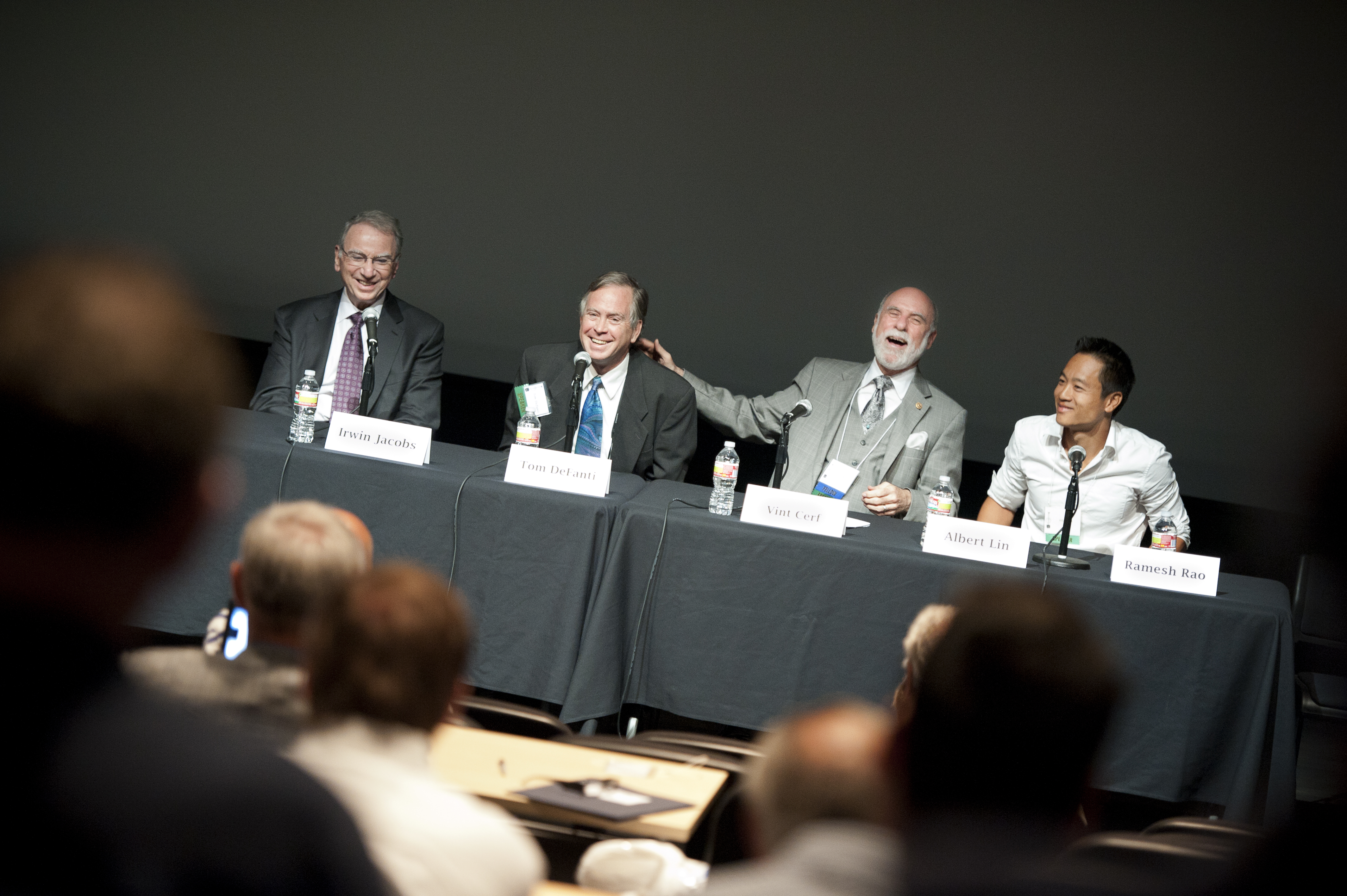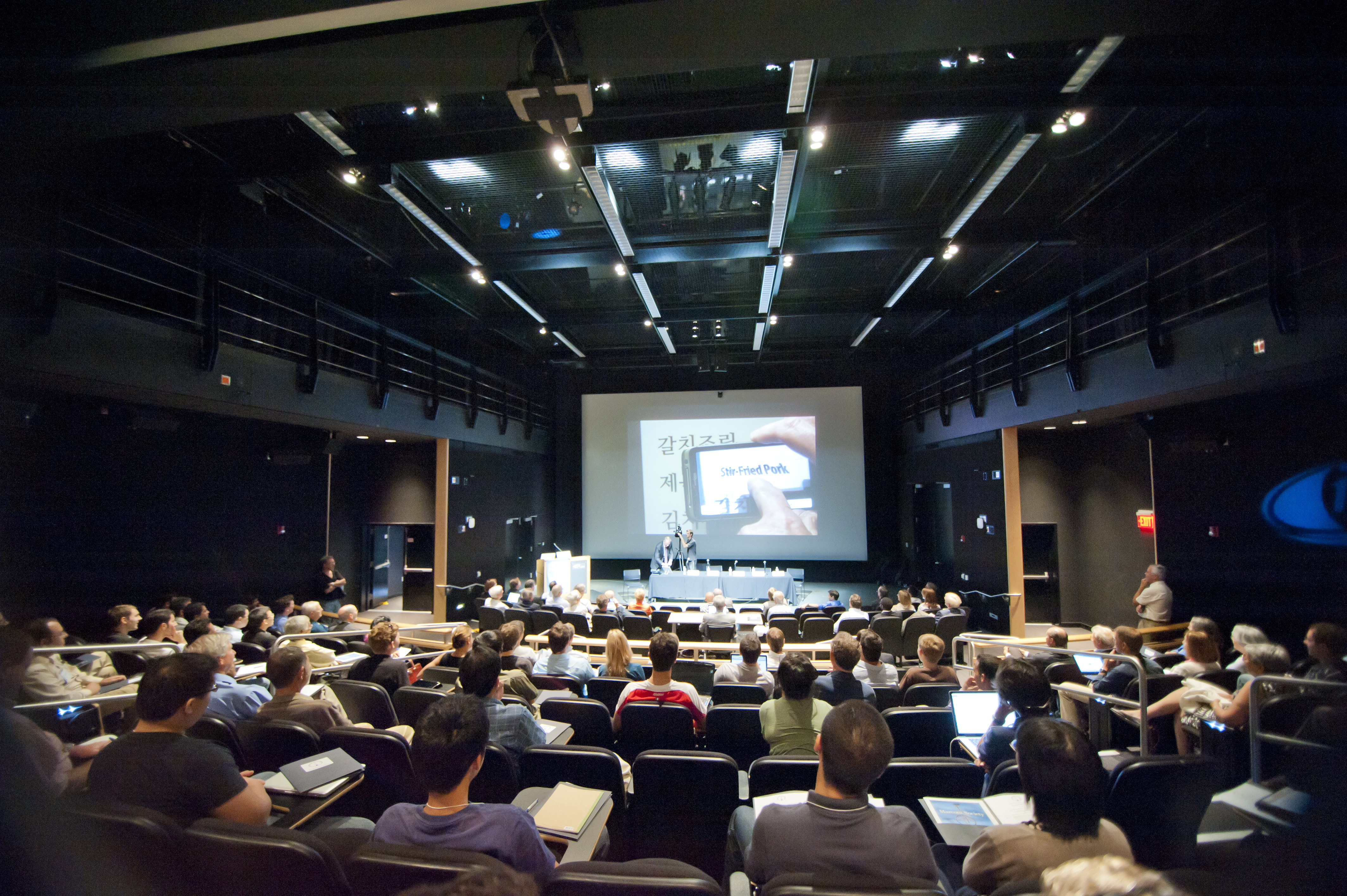Tech Industry Visionaries Foresee 'Internet of Everything' at Marconi Symposium
By Tiffany Fox, (858) 246-0353, tfox@ucsd.edu
San Diego, Calif., Sept. 19, 2011 — The “Internet of everything” has arrived, and according to a panel of prominent experts who assembled at the University of California, San Diego earlier this month for the 2011 Marconi Society Symposium, surfboards, dog collars and even tube socks will one day cross the digital divide and make for an increasingly Internet-enabled world.
This year’s symposium, which was co-sponsored by the Center for
|
Speakers at this year’s Symposium included Jacobs and Google’s Chief Internet Evangelist Vint Cerf, as well as Calit2 Senior Research Scientist Thomas A. DeFanti, Calit2 Research Scientist Albert Yu-Min Lin and several representatives from Bell Labs, Alcatel-Lucent and the University of Texas at Austin.
Not only will the Internet survive, predicted the speakers, but it will become even more robust, mobile and ubiquitous. The coming challenge for computer scientists and engineers will be to reduce energy consumption while accommodating higher traffic densities and faster processing speeds as capabilities and demand increase.
Noting that 5 billion people worldwide now use mobile phones, Jacobs called the technology the “largest platform in the history of mankind” and remarked that “once you have a place to sleep and a little food, that’s the next thing people tend to buy these days.” He predicted that smartphones and related digital technologies will soon be used around the world for wireless health monitoring, education, even tracking lost pets (hence the digital dog collar).
Augmented reality will also become increasingly in-demand, says Jacobs. By way of example, he demonstrated a new Qualcomm-developed application that uses a smartphone’s camera function to translate foreign restaurant menus in real-time (it even converts the price to the desired currency).
He also emphasized the importance of mitigating the energy needs of mobile phones as their usage skyrockets.
“Our goal at Qualcomm has always been to squeeze as much computing as we could out of as little energy as we could,” he added. “On part of a single chip we now have the computing power that used to be in 1-2 racks of equipment.”
Calit2’s Tom DeFanti, a world-renowned expert in data visualization, explored the role that networking and high-resolution displays will play as the Internet performs an increasing number of roles in an increasing number of new markets. Hollywood studios, he noted, are relying more and more on high-speed networking across distances to get movies made more quickly and efficiently because “people will pay any amount of money not to have to drive across L.A.”
“There is essentially no end to what we need to simulate reality,” he added, “so keep your minds open and keep those bits flowing.”
|
Through a partnership with the National Geographic Society (which hosted the crowd-sourcing platform on its website), Lin and his research team were able to solicit 1.8 million human contributions in one month — paving the way for an expedition to Mongolia this past summer that Lin called “very exciting.”
Lin suggested that the notion of crowd-sourcing could be extended to a wide variety of what he calls “crowd-defined problems” such as tracking wildfires in real-time or looking for illegal shipping containers.
“We need data, we need a crowd and we need a problem,” he explained. “The question is will the internet evolve into a collective consciousness of human intention?”
Noting the highly distributed nature of the Internet, Google’s Vint Cerf posited that “the question isn’t whether or not the Internet will survive, but whether or not the government will allow the Internet to survive."
“There is no central control, there is no central authority and it’s operated by independent entities,” he added. “If there is going to be any change to the ‘Net it will be based on decisions made independently and often on the basis of economics and business conditions. Anything that makes the net evolve will have to happen in a very distributed way. “
One thing is certain, said Cerf: “We will have to follow Darwin’s principle: Adapt or die.”
One population that’s having no trouble adapting to the Internet’s evolving nature is the world’s growing number of web developers. Cerf cited the sudden explosion of everyday objects that are now becoming Internet-enabled — everything from surfboards with built-in web browsers to the “smart” wine rack that Cerf had installed in his wine cellar. When the temperature in the cellar surpasses 60 degrees or the humidity drops below 50 percent, Cerf receives an automatic notification on his cell phone.
Cerf predicted that once most common objects and household goods are digitally linked, it will be a trivial matter to search Google Maps for a lost set of keys or a missing sock.
“We used to joke there would be an Internet-enabled lightbulb, and now there is one,” he remarked. “The biggest and toughest problem for me is not the speed of the ‘Net, but the scale as we enable every light bulb and light switch and article of clothing. This proliferation of things increases the number of devices that need to be addressed, which puts a real strain on the Internet.”
The Marconi Society Symposium preceded a ceremony later in the evening to honor Jacobs and the late Jack Keil Wolf, the winners of this year’s Marconi Society Fellowship and Prize. Jacobs and Wolf — who were both professors of electrical and computer engineering at UCSD — were heralded for their efforts to dramatically boost the speed, capacity and accuracy of voice and data transmissions around the world.
The Prize is widely considered to be the de facto “Nobel Prize” for telecommunications. Past Marconi Fellows include Cerf (1998) and Symposium Panel Chair Andrew Chraplyvy of Bell Labs, Alcatel-Lucent (2009) as well as Google founders Sergei Brin and Larry Page (2004), wireless pioneer Andrew Viterbi and Arthur C. Clarke (1982), known both for laying the framework for geostationary communications satellites and for his seminal novel, “2001: A Space Odyssey.”
Sadly, Wolf died just after his selection for the Marconi Prize. His prize was accepted by his grandson, David, at an awards dinner held at the La Jolla Beach and Tennis Club.
Of note: The Marconi Awards ceremony was originally scheduled to be held at La Jolla’s Birch Aquarium, but a widespread power outage later that day forced the organizers to relocate the event — an ironic turn of events after Cerf noted at the Symposium “we are more dependent on electricity than on anything else.”
Media Contacts
Tiffany Fox, (858) 246-0353, tfox@ucsd.edu
Related Links



